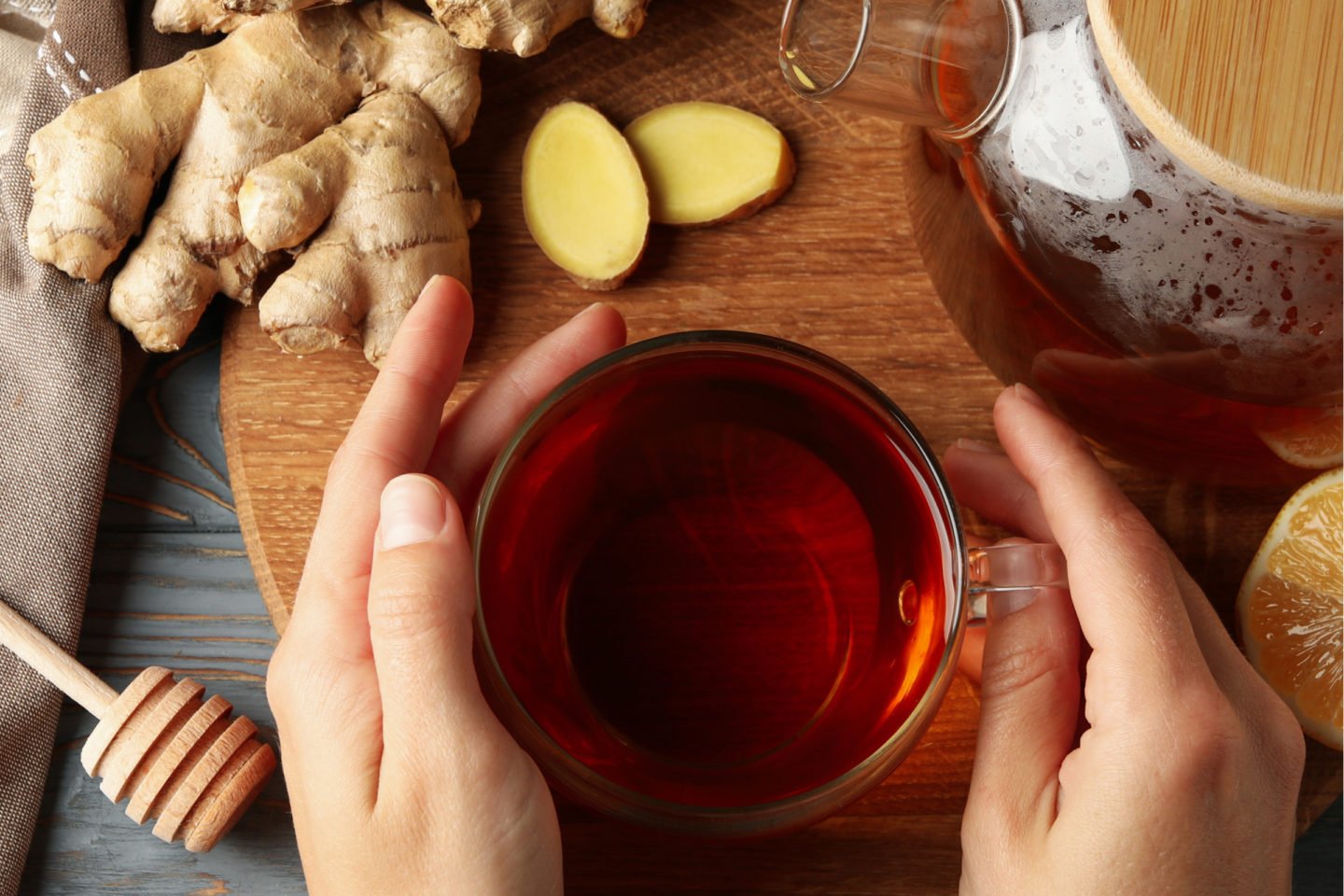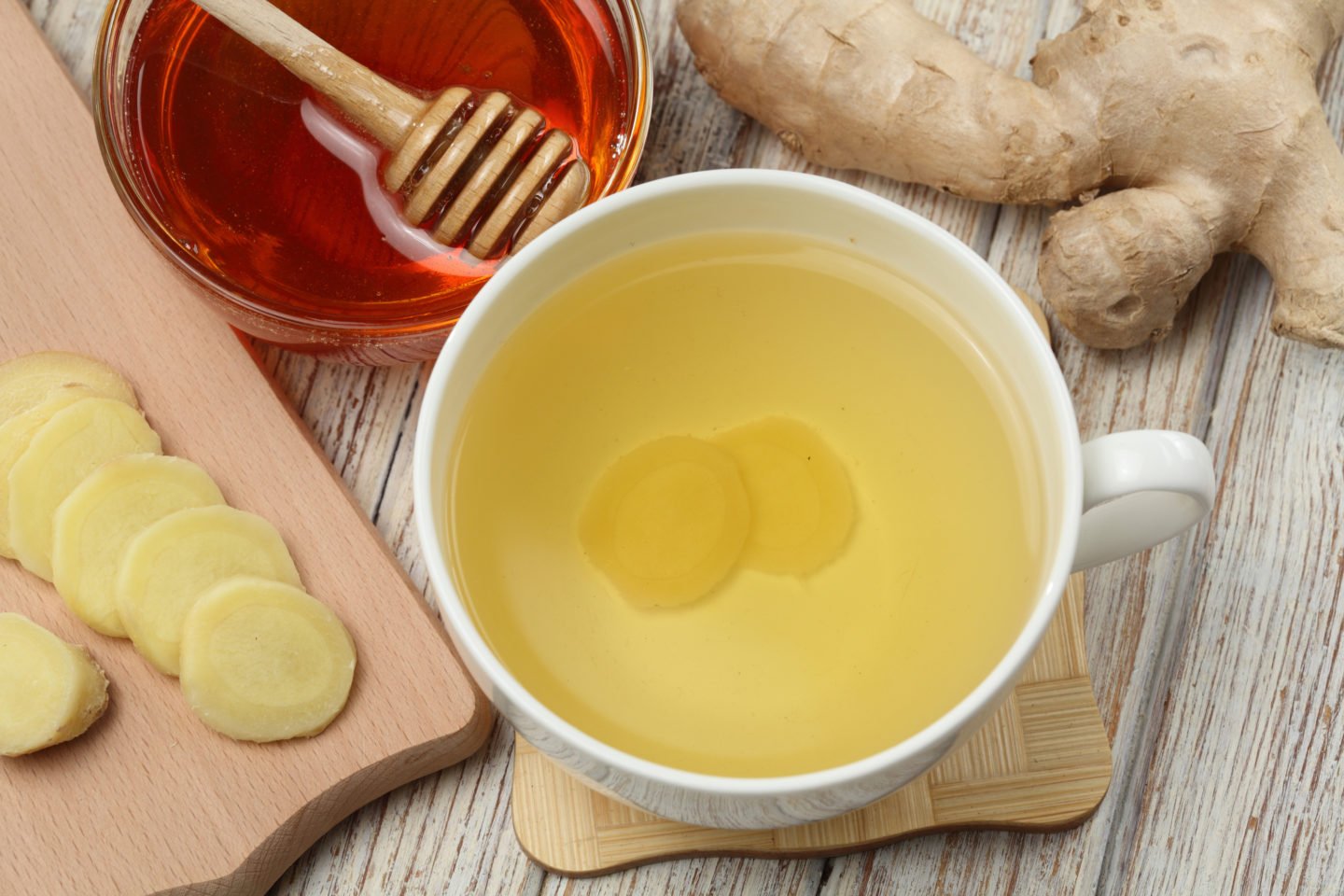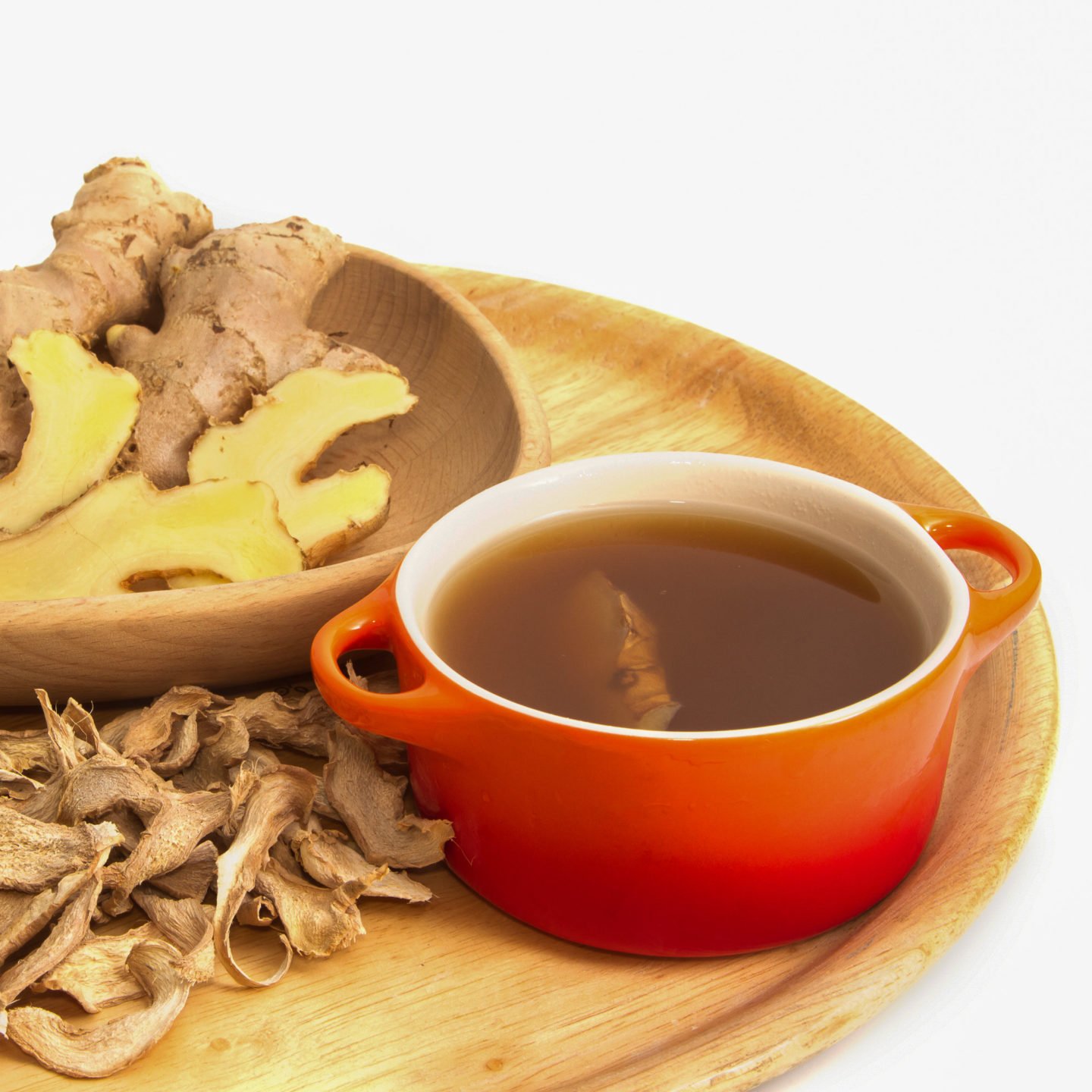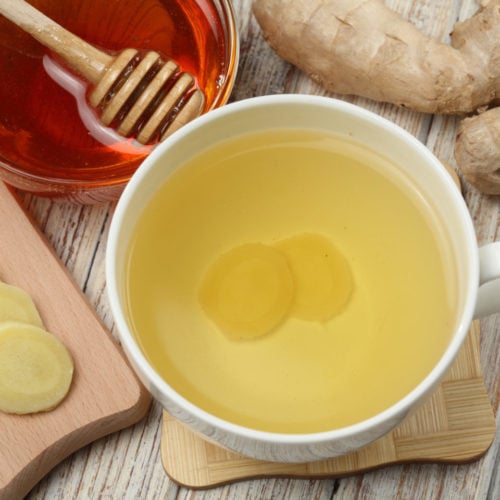More than 60 million Americans experience acid reflux symptoms like heartburn every month, and around 15 million suffer from heartburn every day. While commercial antacids are available, a fast-acting home remedy like ginger tea provides relief without potential side effects.

Ginger tea is a popular herbal tea with anti-inflammatory and antioxidant properties, making it an excellent natural remedy for heartburn relief. Ginger tea also calms the digestive tract and neutralizes acid production during acid reflux. However, taking too much ginger in any form can irritate the stomach and worsen acid reflux symptoms.
When taking ginger as a natural remedy for heartburn, it should be infused as a tea, with a dosage of fewer than 4 grams per 24 hours. This article will discuss everything you need to know about ginger’s effects on stomach acidity, acid production, and acid reflux symptom relief.
Table of Contents
How Does Ginger Tea Help Relieve Acid Reflux?

Has Alkalinizing Effects
Despite being tangy, stingy, and spicy in massive amounts, ginger offers an alkalinizing effect when ingested. Drinking alkalinizing teas helps neutralize stomach acid contents, resulting in acid reflux relief. The water in ginger tea also helps dilute stomach acid, which aids in the immediate resolution of heartburn symptoms.
Relieves Inflammations
Ginger is a potent anti-inflammatory agent. Studies proved its effects against common inflammatory diseases like fever, sore throat, cramps, muscular aches, rheumatoid arthritis, hypertension, toothache, gingivitis, and asthma, to more serious ones like nervous diseases, stroke, dementia, and diabetes.
Regarding the gastrointestinal region, ginger provides relief against constipation, bloating, gastritis, gastric ulcerations, nausea and vomiting, indigestion, and acid reflux. Often, gastroesophageal reflux disease appears as irritation and inflammation in the mucosa, resulting in heartburn symptoms such as tightness of the chest and burning sensations.
Moreover, a 2007 study reveals that antioxidants, anti-inflammatory agents, and natural remedies demonstrate the development of gastroesophageal reflux disease symptoms. Taking more of these substances relieves symptoms and prevents disease progression to cancer.
Promotes Digestion
Did you know digestive functions and acid reflux disease are interrelated? When your digestive system fails to properly break down food, the remnants will stay in your stomach longer. When the food you consume stays longer in your digestive tract, the brain will signal your body to produce more acid to cater to digestion. Due to increased stomach contents, some of the stomach acids escape from the esophageal sphincter and rise to the esophagus.
According to Johns Hopkins Medicine, ginger cuts down fermentation in the stomach. When there is less fermentation, there is less acid and gas production, resulting in faster digestion, constipation relief, and acid reflux relief.
Reduces Muscle Pain
Acid reflux symptoms like heartburn cause tightness of the chest and a burning sensation. Once this happens, the mucosal muscles tighten and produce spasms that cause pain in the chest and throat area. Newer studies suggest that ginger promotes muscle pain relief.
In a study conducted by researchers from Georgia College and State University in Milledgeville, people who took ginger capsules exhibited 25% less muscle pain after vigorous exercise than those given dummy pills. This study supports the claim that taking ginger eases muscle pain caused by heartburn.
Eases Swelling

If you suffer from gastroesophageal reflux disease, your throat and esophagus are likely both swollen. That is because the acids irritate the tissues surrounding your esophagus, resulting in painful swallowing.
Drinking hot ginger tea can immediately bring relief and help heal the damaged tissue in your throat. In addition, ginger contains high levels of anti-inflammatory and antibacterial properties that protect the cells from damage and prevent the tissues from getting infected.
Reduce Nausea
Nausea often occurs when one has gastroesophageal reflux disease. However, it can also be caused by other issues, including anxiety, stress, or motion sickness. Once you vomit, you expose your esophagus to stomach contents, which are almost always acidic.
Ginger keeps your blood pressure consistent and promotes stable digestive functions, which in turn prevents the occurrence of nausea. So instead of buying commercial treatments, take ginger as an effective way of prevention.
Relieves Diarrhea
Although you may think diarrhea has nothing to do with acid reflux, you are mistaken. Once you have diarrhea, your body loses water and becomes dehydrated. As a result, there is insufficient water to dilute your stomach acid, resulting in acid reflux symptoms.
The Medical News Today published an article on ginger’s effects on diarrhea. Aside from its antibacterial properties that prevent microorganisms from causing diarrhea, ginger relieves the intestinal muscles and promotes proper digestion, resulting in diarrhea relief and bringing back the balance in the stomach contents.
How To Make Ginger Tea for Heartburn Relief
Making Ginger Root Tea
Ginger root tea is the best way to take ginger. When making it as a tea, you are diluting its flavors into a calming drink you can tolerate. It only takes three ingredients to make ginger root tea, and here’s how.

Homemade Ginger Root Tea
Ingredients
- 1 cup water
- 1 fresh ginger
- honey to taste
Instructions
- Prepare your fresh ginger by making sure that it’s clean. You can try to scrub it with a rough surface to remove any dirt. Wash your ginger thoroughly. Slice them thinly.
- If you’re making only one serving of ginger root tea, use one cup of water and place it in a saucepan with the sliced ginger.
- Boil the mixture over high heat and reduce the temperature after boiling for one minute.
- Continue simmering the mixture for at least five more minutes. The longer the mixture boils, the more gingery the taste. Turn off the heat once you achieve the desired flavor.
- Let the mixture cool a little. Then, add one tablespoon of pure honey to taste. You can also add a dash of lemon to balance the gingery taste, but this is optional.
- Serve.
Nutrition
How Much Ginger Tea Should You Take?
One can take less than 4 grams of ginger every day. You can take them by mouth or use them to make tea. Remember that although ginger provides relief against acid reflux symptoms, these effects are temporary and do not resolve the condition.
When Should I Take Ginger Tea for Acid Reflux?
Taking ginger at least 30 minutes before or after a meal helps soothe your stomach and prevent heartburn from happening.
What Are The Side Effects of Taking Too Much Ginger?
Possible Heartburn
It may be ironic, but too much ginger can cause heartburn. Since ginger provides a hot sensation, taking too much of it causes a spicy feeling in the stomach, the same thing that happens when we eat spicy food. That will trigger acid reflux symptoms like heartburn.
Ginger also tends to decrease the lower esophageal sphincter pressure, causing it to relax and allow some acids to escape and travel back to the esophagus. If you have gastroesophageal reflux disease, make sure to stick with the allowed dosage to prevent your symptoms from worsening.
Lightheadedness
Ginger is known to lower blood pressure. You might experience hypotension or low blood pressure symptoms like lightheadedness, nausea, weakness, blurred vision, and even fainting when taken in excessive amounts.
Possible Bleeding Problems
If you’re scheduled for surgery, taking ginger may not be the best choice. Ginger contains a substance that inhibits platelet clotting, resulting in poor wound healing and bleeding tendencies. Moreover, if you are under medication for any blood thinners, you should avoid ginger tea.
What Other Teas Relieve Heartburn?

Aside from ginger tea, here are other teas you can drink as natural remedies or home remedies against acid reflux symptoms.
Licorice Root Tea
Licorice root not only relieves pain and inflammation, lowering the incidence of ulcers, but it also increases mucus in the stomach, which may cushion and protect the stomach lining from acid.
Chamomile Tea
Chamomile tea, like ginger tea, is recognized for promoting deep sleep while enhancing emotional balance, ulcer relief, and muscular relaxation. It also has alkalinizing properties.
Fennel Tea
This fiber-rich tea is good for the digestive system because it can help with excess gas, which helps relieve acid reflux symptoms. It also helps to nourish your digestive tract, making you less prone to acid reflux symptoms.
Turmeric Tea
Turmeric may be able to aid with acid reflux in addition to providing a boost of health to your body. Because oxidative stress has been linked to GERD, turmeric's antioxidant properties may help mitigate the symptoms.
Related Questions
Yes. Too much ginger irritates the digestive tract and relaxes the lower esophageal sphincter, allowing some stomach acid to rise to the esophageal lining.
Yes. Drinking warm water helps soothe the esophageal lining and digestive tract. Water also dilutes the stomach acid, preventing heartburn symptoms.
High-fiber foods and alkaline foods are great for maintaining a healthy digestive tract. Moreover, refraining from fatty foods, spicy foods, fried foods, caffeinated drinks, carbonated drinks, and acidic foods also helps manage acid reflux.

Leave a Reply